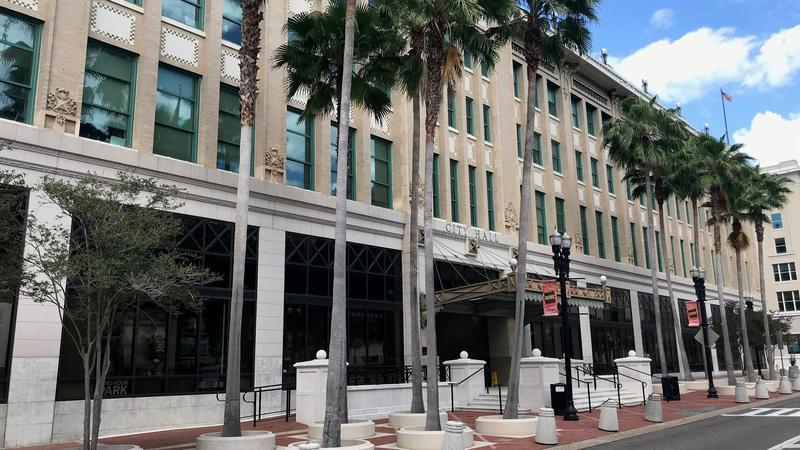Jax Councilmen Propose Programs To Help Jail Population And City’s Uninsured Residents

Article by Sky Lebron, WJCT News
Two Jacksonville City Councilmen are looking to launch a pair of pilot programs. One aims to help inmates suffering from mental health issues, while the other would help thousands of city residents who don’t have health insurance.
Councilman Ron Salem, along with Councilman Michael Boylan, held a public meeting Wednesday morning to discuss the proposals and mull over any early concerns.
Meanwhile, Boylan is working on a bill he believes is a “complimentary program” to Salem’s proposal.
The program, called JaxCareConnect, would aim to help some of the more than 100,000 people in Jacksonville who do not have any health insurance coverage.
WeCareJax Executive Director Angela Strain said that many uninsured people will go to emergency rooms to get medical attention.
“We have capacity currently today to serve an additional 2,000 patients through this project, which could save almost $4.4 million if these patients do not return to the [emergency department] for the care that they could receive in primary care,” Strain said.
Strain said three quarters of the uninsured adults in Duval County have one or more jobs, but no access to healthcare.
Her organization is in the process of streamlining the program to make it easier to determine if someone is eligible, according to Strain.
The pilot program would last until 2023.
“We’ll be able to do more data collection and enhancement understanding how people are moving across our giant service area in Duval,” Strain said. “What are the barriers? What are the things that they need to ensure that they can remain in care and better served with their primary care?”
There are currently clinics that WeCareJax has partnered with to help run the program, with $20,000 going to each to handle the increased patient rate.
Strain said the organization has modeled the program off of what other Florida counties are doing, such as St. Johns County and Flagler County.
Both bills will be brought back to the Social Justice and Community Investment Committee. Right now, the committee members are in the process of creating multiple bills that will be combined before going to the full council process.
“I think there’s going to be some very unique proposals coming out of social justice [committee],” Salem said. “And I think for that purpose, it served as a great place for ideas and such.”
Meanwhile, Salem’s proposal would create a diversionary program for individuals coming out of the Duval County jail, known as MHOP (Mental Health Offender Program).
In its pilot year, Salem said the program would cost approximately $400,000, with $200,000 coming from the Jacksonville City Council’s Social Justice and Community Investment committee, and the other half coming from a match with the Jacksonville Sheriff’s Office.
“We run the largest mental health facility in Northeast Florida, and unfortunately it’s our jail,” said Sheriff Mike Williams.
Williams said approximately 13% of the jail’s population comes in with a need for psychotropic medication.
“You can double that or more, you know, as we see it through the screening process,” Williams said.
Williams said he was excited for the MHOP program because it would help keep people from returning to prison, and do more to rehabilitate people when they leave the jail.
“We may stabilize people when they come into the jail,” Williams said. “We’re proud of what we do in terms of health and mental health inside that facility, but that’s not the answer. That’s a band-aid. That’s not an answer for this problem. We need a long-term comprehensive plan for our community to deal with these people and get them back on track.”
The sheriff also said it would be key for Downtown Jacksonville’s revitalization.
“As we talk about Downtown redevelopment in the years to come, [and] we talk about moving the jail [or] building a new jail, this type of program is going to be essential because ideally, you want to have some facilities or a facility to help facilitate a program like this,” he said.
In its first run-through, Salem said the program could help 20 to 40 people who would’ve gone to jail otherwise.
The program would largely be facilitated by the Sulzbacher Center, located just across the street from the Downtown jail.
Sulzbacher’s CEO Cindy Funkhouser said the program would be similar to the homeless center’s Chronically Homeless Offender Program, also known as CHOP. However, this program will provide a broader base of services.
This will include behavioral health services, medication, job placement connections, housing help, and more.
Funkhouser said this year, there has been a rise in the number of homeless people arrested with mental health concerns.
“This year – January through September – 658 people have been arrested with a mental health flag, and of those, 242, or 37%, are homeless,” Funkhouser said.
In 2019, 925 were arrested with a mental health flag, while only 92 were homeless.
“Generally speaking, mental health and mental illness right now is through the roof because of COVID,” Funkhouser said. “Everyone knows that, and so this program could not come at a better time.”
Article can be found by clicking HERE.
